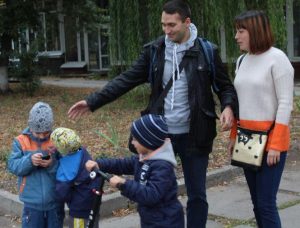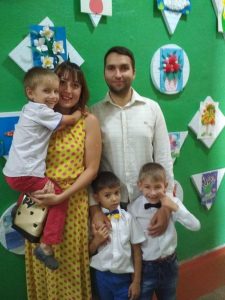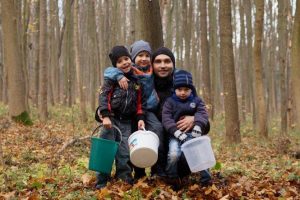Volodymyr and Nadia had been married for seven years when the Maidan began. Both of them became very involved. After the revolution, Nadia knew that her husband would want to go to the front lines. However, he was turned away at the recruiting centre. He returned a second time, but with no result. He had health problems and went for surgery. Some time later, Syrovatka was mobilized. The day he went, Nadia was the only one to accompany him. They had always wanted children of their own, but there were no little ones in the family. They had talked about having at least three, but far from imagining that they would arrive all at once. Nadia has two brothers, and Volodymyr has two sisters. Such was their frame of reference, but as fate would have it, they could find no answers for their infertility.

Nadia accompanied her husband when he departed for war. It was September 2014. Hundreds of men had just perished at Ilovaisk. The daily news from Donbas was bad…
As Volodymyr and Nadia share their story, three active little boys enter and leave the room during into our conversation: Artem, Maksym and Mykola. These are their children.
A bouquet… of colourful socks
Volodymyr has returned to his earlier job at the Ministry of Culture. He has two university degrees, as a lawyer and a Masters in Public Administration. Nadia recalls how all their colleagues gathered to send their co-worker Volodymyr to the front with the proper equipment: helmet, vest, sleeping bag, backpack, and all contributed financially. Their families helped as well.

Volodymyr explains that he underwent military training in Lviv Oblast. The courses were short, since at that time reinforcements were needed at the front lines. He spent two weeks learning to act as commander of an armoured infantry vehicle.
“It’s good that I'd been in the army for the two years as a young man. I knew what to expect. Other men didn’t have that background.”
Syrovatka was assigned to one of the battalions of the 28th Brigade. He took his combat readiness courses at Shyroky Lan training base in Mykolaiv Oblast. It is there that he celebrated his 30th
birthday. He laughs as he recalls that moment:
“I received a present that I’ll probably remember for the rest of my life. Around that time, civilian volunteers had delivered humanitarian aid to our battalion. The men from my unit hadn’t planned for it, but most of them received… socks. Suddenly our feet were bright with a bouquet of colours.”
When they reached the Anti-Terrorist Operation zone, their battalion first went to Karlivka. Then, they were deployed at Krasnohorivka, a stone’s throw away from Donetsk. One can well imagine the conditions under which they lived, protected by tents, meals taken from food supplies left by others… It took some time, but their supply chain of food and water did improve.
They faced a chronic shortage of officers. Their ranks were filled with those like Syrovatka who had a good education. Within three months, he was executing the duties of a deputy company commander responsible for his men.

A late phone call from a brother-in-arms
Their positions were shelled nearly every day. During one of these bombardments, Volodymyr was running for cover, and as he stooped down, he tripped and fell. Right at that moment, shrapnel whistled overhead, tearing like a blade through the tent covering. That same night, in Vynnytsia, his wife was awakened by the telephone. She still gets goose bumps thinking about it.
-Are you Nadia? I’m Volodia’s friend…” said an unfamiliar voice.
-What could I possibly expect after such an introduction? she asks.
The reason for the call was to get Nadia to talk with her husband so that he would be more careful. His acts of heroism meant that sometimes during enemy artillery bombardments he refused to take cover.
One of the most intense days of shelling was the 3rd of June, 2015. That was the day the Russian occupation forces and their “separatists” intended to capture Mariinka. They opened fire at 4 am. There had yet been any command to return fire, so the brigade commander took charge. This incident is well known through media coverage. It is quite possible that such publicity saved the officer from retribution for his actions. The colonel even received a promotion.

Volodymyr especially remembers his three comrades killed in that action. What they had in common was that they were all unmarried and childless, no children to carry on their name. The idea of having children stirred Volodymyr. He made a promise at their funerals to begin the adoption process as soon as he returned home from military duty. He and his wife had exhausted all fertility options, at no small expense with doctors, and they even considered an idea suggested by the monks of Mount Athos. Volodymyr and Nadia smile when then recall turning to monks at a monastery in Greece after reading about them on the internet. The monks replied, sending them grapevines and a prayer.
“If it worked, we were asked to let them know. You won’t believe everything we went through for a child!”
Most of their acquaintances and family were sympathetic. When the decision to adopt was announced, some were surprised. Their first attempt was a disappointment as there was no local orphan 3 years or younger, their initial target age. An entire article could be written about the number of documents that they filled out along the way.
“They know everything about us now. Whether it should be like that or not, I really don’t know. But that’s the system.” says Nadia.

While they were waiting for an answer, Volodymyr went to Odesa as part of his military service. He met with a civilian volunteer, a woman whose organization often interacted with soldiers when they delivered supplies. She was the head of a raion government administration in Odesa Oblast, and Volodymyr was appointed as her first vice administrator. Thus, the family moved to Odesa Oblast. They amended their adoption documents to show their new location. Then, they received good news that they would be able to consider adoption in their new area.
One young mother had placed her new-born daughter for adoption. For two months they visited the baby in the hospital. They bought baby clothes, fed her, sang songs to her, and even bought a baby carriage. According to law, they had to wait two months. During this time, the biological mother could reconsider and return for her baby.
Nadia explains that one day was left. The adoption agency representative made one last phone call to the baby’s mother. She was resolved in her decision to allow the baby to be adopted. What happened next, however, is hard to explain, because the father now wanted the baby. He was 19 years old. There was a huge disappointment when they realized that they would no longer become parents. They gave the baby a kiss on the hands and left.

Other opportunities presented themselves in Odesa. One possibility was a little boy, and a second was three little brothers, who caught the attention of the Syrovatka family. Volodymr thought about the three soldiers he had lost. When he met the children, he found that them together, although they were of different ages. Mykola was the youngest of the three. There were bruises on his face. The middle child was Maksym, and he was a year older than his brother. Artem was the oldest. Today, he is in grade 2, but back then, in 2016, he was all of 5 years old.
“Their mother renounced all her maternal rights,” says the Syrovatka family.
They had been adopted by a family initially, but that did not work out. Certain adults were mean to them. One of the boys even had his leg broken. During the first few days, Volodymyr and Nadia could not understand why the children kept kissing their hands, or when they put on their shoes, the children would kneel down in order to tie their shoelaces.
“As time went on, we learned that they had been in a pastor’s home. That’s where they learned these things.” says Volodymyr.
Artem broke a window on the first day of school

December 14, 2016, can be considered a real birthday for their three boys. It was just before St. Nicholas Day that the children came to live with the Syrovatkas. At that time, the Syrovatkas lived with Nadia’s parents. It was not an easy time. They began calling the boys their sons, and the boys would call Nadia their mother, but they did not say much else. They would express their frustration by falling to the floor in fits or lying still on the floor.
“These episodes would happen at home and in also in public. Strangers would approach me and give me a lesson in how to raise my children or threaten to call the police.” explains Nadia.
Adapting to daycare was not easy either. The brothers would pick fights with others, or take someone else’s food, or ignore the staff. That went on for about a year. Then the brothers began to change noticeably. Today, they do not cause any trouble, neither with their teachers nor with other children although their family name, Syrovatka, is well known. When Artem began grade one, on the first day of school he broke a window. It shattered completely...Both his dad and the teacher took it with a grain of salt.
At the beginning of this year, the entire family accompanied Maksym on his first day of school. Volodymyr and Nadia firmly believe the most difficult period is behind them. What is really important is that they have their own family life. They own an apartment, which is in an old wooden building with a wood-burning furnace. But it is theirs, where the children can make noise and run around…

The Syrovatka family, parents and children meet me at the library. The boys take an interest in books. There is also a games room. Artem shows me a game in which the objective is to put words together. The first one out is Maksym. He is an expert on the scooter. Artem and Mykola are glued to a game they are playing on their phone.
-Tell us about your dance class, says Volodymyr.
-At “Barvinok”, it’s great, answers the oldest.
-I like it too, adds the next brother.
And only the third disagrees… He says his feet hurt when he dances.

